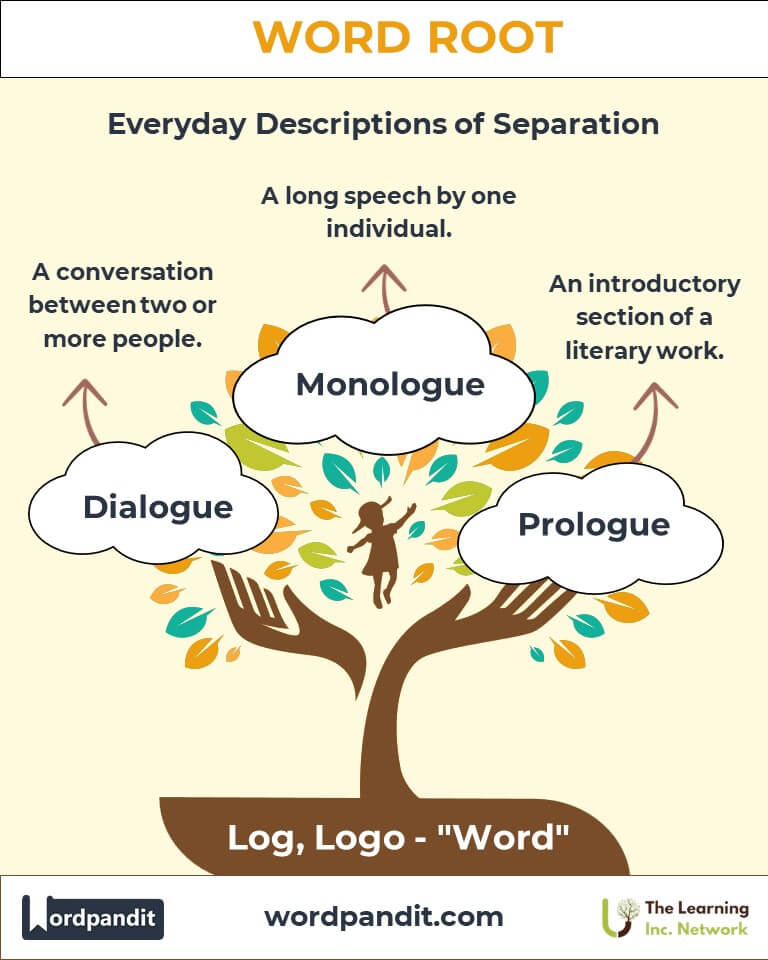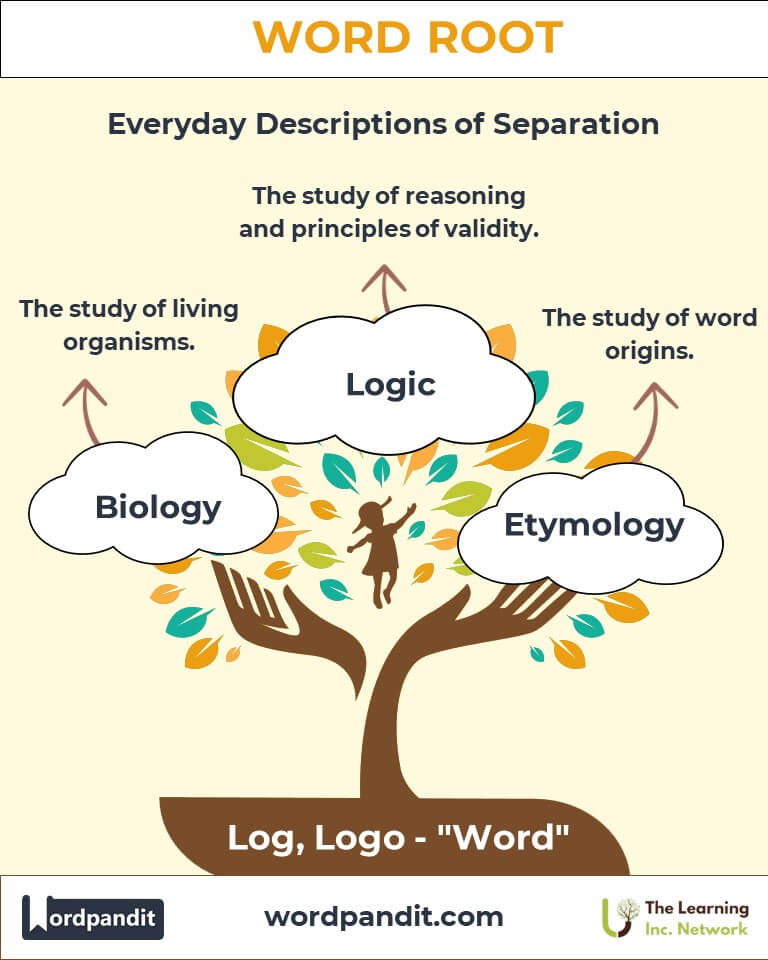Log, Logo: The Power of Words and Reasoning
Uncover the rich heritage of "log" and "logo," roots derived from Greek, meaning "word" or "study." From "biology" to "dialogue," these roots serve as the foundation of language, science, and communication, highlighting humanity's quest for understanding and expression.

Table of Contents
- Introduction: The Essence of Log and Logo
- Etymology and Historical Journey
- Mnemonic: Unlocking the Power of Log and Logo
- Common Log/Logo-Related Terms
- Log and Logo Through Time
- Log and Logo in Specialized Fields
- Illustrative Story: Log and Logo in Action
- Cultural Significance of Log and Logo
- The Log and Logo Family Tree
- FAQs about the Log and Logo Roots
- Test Your Knowledge: Log and Logo Mastery Quiz
- Conclusion: The Living Legacy of Log and Logo
Introduction: The Essence of Log and Logo
How do we explore life, communicate ideas, or engage in dialogue? At the heart of these endeavors lie the roots "log" and "logo," pronounced as "log" (like "log cabin") and "loh-go." Derived from the Greek word "logos," meaning "word" or "reason," these roots underpin concepts of language, reasoning, and study. Across disciplines, they reveal our ongoing effort to understand and articulate the world.

Etymology and Historical Journey
The roots "log" and "logo" trace back to the Greek "logos," a term rich with philosophical significance. In Ancient Greece, "logos" represented not only "word" but also "reason" and "principle," as explored by thinkers like Heraclitus and Aristotle. With the spread of Greek learning, the roots permeated Latin and eventually English, forming the backbone of scientific and literary terminology.
Mnemonic: Unlocking the Power of Log and Logo
Imagine a glowing book labeled "LOGO" that radiates knowledge and sparks dialogue among eager learners. Each page unfolds a study, a word, or an idea, reminding us of the root’s essence.
Mnemonic Device: “LOGO brings words and studies together to illuminate reason.”
Common Log/Logo-Related Terms
- Biology (bye-OL-oh-jee): The study of living organisms.
Example: "Biology explains the intricate mechanisms of life." - Dialogue (DYE-uh-log): A conversation between two or more people.
Example: "Their dialogue revealed shared hopes and aspirations." - Logic (LOJ-ik): The study of reasoning and principles of validity.
Example: "Logic is essential in solving mathematical problems." - Monologue (MON-uh-log): A long speech by one individual.
Example: "The actor's monologue captivated the audience." - Prologue (PRO-log): An introductory section of a literary work.
Example: "The prologue set the stage for an epic adventure."
Log and Logo Through Time
- Logos in Philosophy: Ancient Greek philosophers like Heraclitus used "logos" to denote the universal principle of order.
- Biology in the Enlightenment: By the 18th century, biology emerged as a systematic study, reflecting humanity's curiosity about life.
Log and Logo in Specialized Fields
- Medicine: Cardiology (kar-dee-OL-uh-jee) - The study of the heart.
- Technology: Logarithm (LOG-uh-rith-uhm) - A mathematical tool for simplifying calculations.
- Linguistics: Etymology (et-uh-MOL-uh-jee) - The study of word origins.
- Theater: Dialogue - Essential for character development and storytelling.
Illustrative Story: Log and Logo in Action
Sophia, a budding biologist, loved engaging in dialogues about her findings. One day, while presenting her research on marine biology, she used logic to counter a skeptical question, demonstrating the beauty of reason and the power of words. Her passion for the "log" and "logo" roots reminded her audience of their centrality to knowledge and communication.
Cultural Significance of Log and Logo
The roots "log" and "logo" have shaped human culture profoundly. From Socratic dialogues to modern scientific breakthroughs, they signify humanity's dedication to reasoning, studying, and sharing ideas. Whether in storytelling, academic research, or daily conversation, their impact is omnipresent.

The Log and Logo Family Tree
- Lex (Latin: "word"): Lexicon - A dictionary or word list.
- Voc (Latin: "call, speak"): Vocalize - To utter or express in words.
- Scrib (Latin: "write"): Manuscript - A handwritten document.

FAQs About the "Log" and "Logo" Roots
Q: What does "log" mean?
A: "Log" means "word" or "study" and originates from the Greek word logos. It conveys reasoning, speech, or systematic study, as seen in terms like "logic" and "biology."
Q: What is the origin of "logo"?
A: "Logo" is derived from the Greek logos, which means "word" and also includes reasoning or principle. In modern contexts, it appears in branding, symbolizing identity and communication.
Q: How does "log" relate to reasoning and study?
A: The Greek "logos" embodies thinking, reasoning, or studying systematically. Terms like "logic" reflect this connection by denoting structured processes of reasoning.
Q: What does "dialogue" signify, and how is it rooted in "log"?
A: "Dialogue" stems from "dia" (across) and "logos" (word), signifying an exchange of words or ideas between individuals. It represents interaction and reasoning in speech.
Q: Why is "biology" considered a log-based word?
A: "Biology" combines "bio" (life) and "logy" (study), meaning "the study of life." Many scientific fields use the suffix "-logy" to denote systematic study areas.
Test Your Knowledge: Log and Logo Mastery Quiz
1. What does "logos" mean in Greek?
2. Which term refers to reasoning principles?
3. What is a monologue?
4. What does "biology" study?
5. Which field uses logarithms?
Conclusion: The Living Legacy of Log and Logo
The roots "log" and "logo" embody humanity's relentless quest for understanding and communication. From the philosophical musings of Ancient Greece to today’s scientific advancements, they illuminate our world through words and reason. Let these roots inspire your journey into language, logic, and learning.














